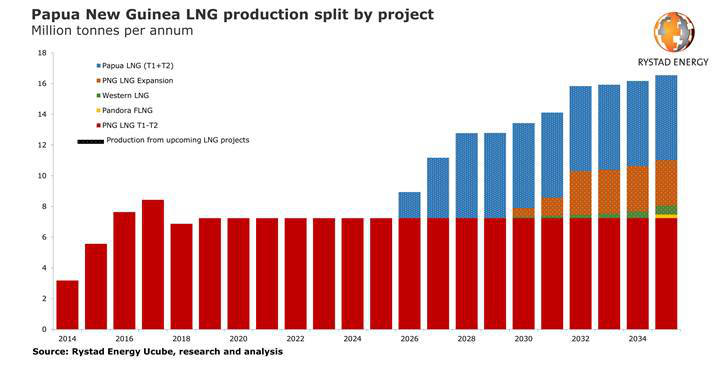Deadlocked in Papua New Guinea
Mar 03, 2020Multibillion LNG projects set for delays as negotiations hit wall
The decision by the government of Papua New Guinea (PNG) to halt talks with ExxonMobil about the state’s share of revenues from the planned P’nyang gas field development is set to delay two key liquefied natural gas (LNG) projects that would double the country’s gas output, Rystad Energy estimates show.
The two projects, Total’s $13-14 billion Papua LNG investment and ExxonMobil’s subsequent PNG LNG Expansion plan, are located close to each other and could save the firms up to $3 billion in shared infrastructure synergies through a combined development.
Using gas from P’nyang, Papua LNG is planned to add two LNG trains and PNG LNG Expansion a third one, each with a capacity of 2.7 million tonnes per annum (tpa) of LNG. The projects would double Papua New Guinea’s current gas output, which was 8 million tpa in 2019.
As a result of the deadlock, Rystad Energy estimates that the delays in reaching a financial investment decision (FID) and conducting engineering, procurement and construction (EPC) works will postpone Papua LNG’s first production to 2026 and the PNG LNG expansion to 2029.
"This not only leaves bruises on the operators involved, but also has implications for the service companies performing EPC services on the fields," says Rystad Energy’s Upstream Analyst Priyanka Choudhary.

Papua New Guinea’s new Prime Minister James Marape has made it clear that every new development should have more favorable terms for the state than previous projects. The country wants to see a government take of revenues higher than 40% and an obligation to sell up to 15% of the gas in the domestic market.
Rystad Energy believes both projects are going to be delayed for quite some time. Developing the projects separately could push the FEED award for the Papua LNG project from the first quarter of this year to the end of this year, with first production expected to be delayed until 2026.
Failure to reach a deal over P’nyang will also have an effect on the timing of the FID for the PNG LNG Expansion. FEED for the PNG LNG Expansion is set to ramp up when construction activities are ramping down for Papua LNG’s two trains. FEED is now expected to start in 2024. This will further delay the FID by two to three years due to the crowded market for EPC onshore LNG plant services.
Rystad Energy estimates that around $80 billion worth of LNG projects around the globe are going to be approved over the next few years, adding nearly 110 million tpa of new liquefaction capacity by 2025‒2026. With a very limited number of service contractors able to handle huge EPC LNG plant contracts, it will be a race between operators to get projects launched on time.
Similar Stories

Stena RoRo takes delivery of the battery hybrid vessel Guillaume de Normandie
View Article
Improved efficiency is enabling record U.S. crude oil production from fewer rigs
View Article
U.S. Department of Energy announces $7.1M in support of local energy project planning, siting and permitting
View Article
Performance of Global Shipping segments to diverge in 2025
View Article
Clean Arctic response to Kerch Strait heavy fuel oil spill from Antiquated Tankers
View Article
Dragonfly Energy and Stevens Transport, Inc. champion fleet hybridization with Battle Born® All-Electric APU deal
View ArticleGet the most up-to-date trending news!
SubscribeIndustry updates and weekly newsletter direct to your inbox!





